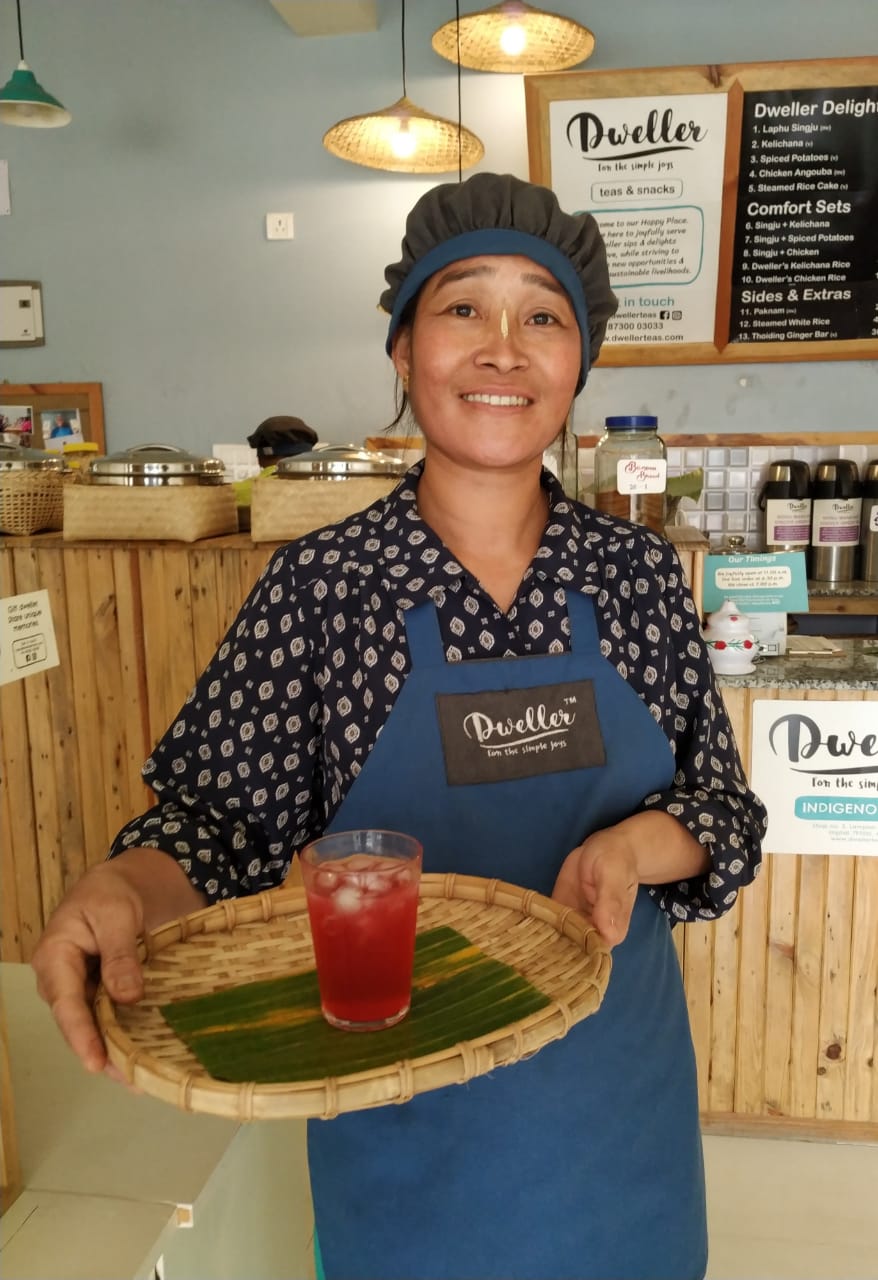It is around 8 am and 45-year-old Pratima is excited to begin her day. Her daily sojourn through Imphal’s Ima Keithal market or Mother’s market is a sensory onslaught of brightly coloured textiles in myriad shades, the array of spices tempering the air, and stalls bursting with fresh flowers, fruits and vegetables.
Pratima loves the all-women market but what she loves more is the cafe-cum-store where she works, hardly a kilometre from the 500-year-old market.
Pratima is one of the nine homemakers-turned-employees working at ‘Dweller Teas,’ a startup in Manipur’s capital city.
Warming up to the topic of the many benefits of the fruit, Pratima says, “Every time I drink a citrusy flavoured tisane of this fruit, I go on a nostalgic trip that reminds me of the time I spent with my grandmother.”
Founded by Elizabeth Yamben, a native of Imphal, the startup uses indigenous herbs and fruits to make organic and healthy tea infusions.
What’s more? The startup is empowering homemakers and female farmers.
The seed of the startup was sown during Elizabeth’s stint in London as a financial analyst. Though the 29-year-old was grateful for her new life in the bustling city, she felt restless, as if something remained to be done.
“I moved out of Imphal at the age of 12 in pursuit of quality education, and a thriving future. I moved to London right after I completed my education. I always wanted to do something of my own, but had very little expertise in terms of starting a business,” Elizabeth tells TBI.

Soon, she took a transfer to Singapore. Once she thought she had saved up enough, she was ready to trade a cushy job, a fat salary and a secure life with a path less travelled—one fraught with risks, uncertainty and financial instability.
As anticipated, quitting her job without any concrete professional plans did not go well with her parents. “I may not have been confident about my future then, but I was sure I wanted to make a difference in my community.”
After landing in India, Elizabeth’s first step was to study and identify the local strengths of Manipur, “Football and tea are two strong points of my State. The choice was obvious,” she chuckles.
Besides, Elizabeth’s priceless memories with her grandmother revolved around herbs and its secret recipes, “I grew up in a household where traditional herbs and medicines were used every time someone would fall sick. I remember my grandmother soaking the herbs or plants overnight and making concoctions that would eliminate all our ailments.”
Even today many Indian households depend on homemade cures. So, I fused traditions and a product that is available in abundance, she adds.
With her savings Elizabeth launched ‘Dweller Teas’ in 2017.
She hired around nine women homemakers and three men. The objective of hiring women was to give a tender touch to the products. She saw how passionate the elders in her family were about using indigenous fruits and herbs.

The gamble worked, and today, each of its tea products is packed with the nutrients that the herbal mixtures offer along with loads of love and care from all the women involved in their manufacture.
I convert our indigenous herbs and fruits into infusions. I make them just like how I would, for my three children, says Indu, one of the employers at the cafe.
Interestingly, the growers of fruits and herbs that Elizabeth works with are all women.
There are two ways in which Elizabeth procures the harvest. She approaches the women farmers and provides them with seeds depending on the demand. Once the product is ready, she purchases it from them, thus giving them an extra source of income.
She has also collaborated with local women vendors who sell the herbs in the local markets. This way Elizabeth has also been instrumental in reducing wastage.
Giving an example, she says, “One day I was strolling in the market and came across this lady who was worried about selling her Indian olives. She told me about how the olives get wasted almost every day because there are very few takers. So, I buy her produce from her thus reducing the wastage.”
Lemongrass is another plant that is cultivated in abundance. Here too, Elizabeth helps out the farmers as she buys lemongrass for the aromatic tea she prepares with them.
There are several blends of herbs, fruits and vegetables that Elizabeth and her team use to make the tea. All of the varieties have a unique USP of their own.
For instance, their famous blend is Nong-mang-Kha or Phlogacanthus thyrsiformis plant. The antibacterial properties of the plant can cure a cold, cough and fever.

“It is a sacred plant of Manipur. It’s commonly planted for house fencing, food, medicine and to protect from the evil spirit psychologically. Surprisingly, it tastes smooth with the warmth of ginger,’ says Elizabeth.
Giving a thumbs up to Nong-mang-Kha, Joyraj, one of Dweller’s customers says, “This tea is magic! Though it is bitter, it has rich medicinal value, and the aroma of the tea is a huge relief.”
Meanwhile, red-coloured and caffeine free fruity roselle tea tastes like cranberry and contains hints of citrus olive. It is rich in vitamin C, and is traditionally consumed to improve metabolism.
As she is sourcing her raw materials from nature, she makes sure she gives back in kind and thus all the packaging at Dweller Teas is biodegradable. At the store, the tea is sold in banana leaves and paper boxes.

Up until recently, all the Dweller’s products were sold offline at their store. Last year, Elizabeth ventured into the online platform. Her products are now sold pan India. She plans to open five such cafe-cum-stores in Imphal by the end of this year.
From overcoming financial loses to creating her little niche, there were a lot of ups and downs in Elizabeth’s two-year-old journey. However, she remained undeterred in her mission of uplifting the locals, dwellers, homemakers and herbs.
Pratima, who has studied till class eight, had never imagined her life would take a turn making her financially independent, “I enjoy my work, and it has given me the hope for a better future. I see myself growing here; it is like carving a new path that never existed before.”
Gopi Karelia




